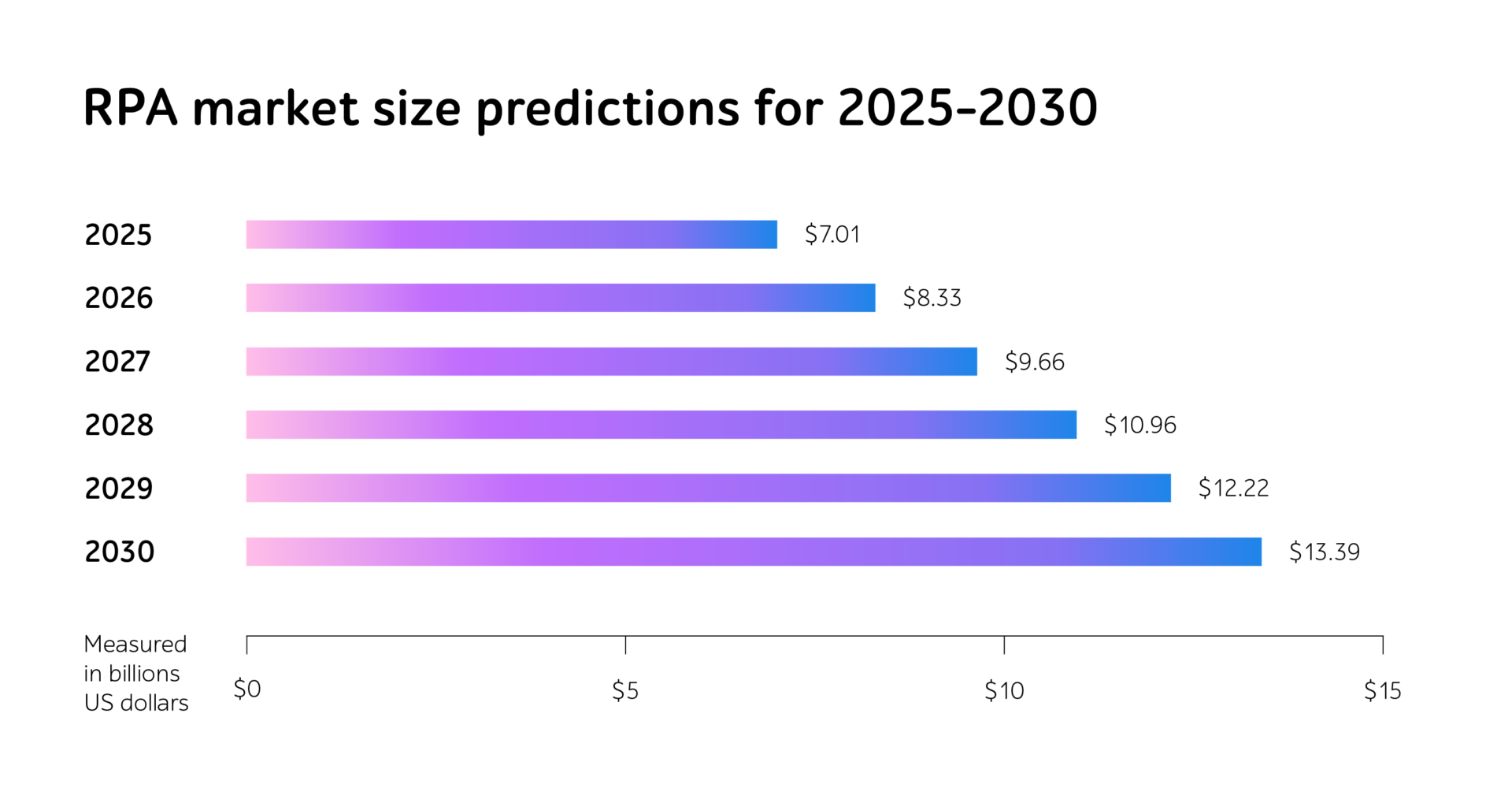
Embracing robotic process automation to drive efficiency in QA
Over the past years, we have witnessed a profound transformation driven by the emergence of new technologies and processes.
At the forefront of this revolution is robotic process automation (RPA), a technology gaining significant traction across industries. RPA offers a compelling solution for organizations seeking to streamline operations and enhance efficiency by leveraging software bots that automate repetitive tasks.
RPA can be a valuable assistant for automating specific tasks within software testing, enabling businesses to achieve unparalleled levels of speed, security, and reliability of their IT products.
In this article, we’ll explore the intersection of RPA and QA, delving into its impact, challenges, and strategies for successful implementation.
Understanding RPA
In recent years, RPA has emerged as a transformative technology, revolutionizing the way organizations streamline their business operations and enhance process efficiency. It’s predicted to reach $13.39 billion by 2030.

Source: Statista
At its essence, RPA involves the use of bots to automate mundane, time-consuming, and repetitive tasks traditionally performed by humans. These activities range from data entry and document processing to system integrations and report generation. Thus, RPA allows for freeing up human resources to focus on higher-value activities.
To illustrate the practical application of RPA, consider a scenario in customer support operations. Imagine a company receiving a high volume of end-user queries through various channels, such as e-mails, chats, and social media. Without RPA, handling these queries would require manual intervention.
However, with RPA in place, this process can be automated. Bots can be programmed to monitor incoming messages, analyze their content using natural language processing algorithms, and route them to the appropriate departments based on predefined criteria. This accelerates response times while ensuring consistent handling of client queries, improving overall satisfaction levels.
Another example of RPA usage relates to accounting operations. Invoice processing and financial reporting often involve repetitive data entry and manipulation across multiple systems. RPA bots can be deployed to automate these tasks, extracting data from invoices, entering it into accounting software, and generating reports with minimal specialist efforts required.
RPA in software testing: unlocking the value
By combining RPA with traditional QA practices, businesses unlock a myriad of benefits that streamline testing processes, enhance productivity, and reduce costs.
To begin with, RPA in software testing helps automate tedious testing tasks, like test case execution, data verification, regression testing, test environment setup and configuration. By leveraging RPA, organizations accelerate the QA lifecycle and deliver high-quality software products within shorter timeframes.
Another advantage is continuous monitoring. RPA bots can be deployed to track key performance indicators, system metrics, and user interactions in real-time, identifying potential issues and anomalies. By controlling the software under test, organizations can detect and address defects early in the SDLC stages, thereby minimizing the risk of costly errors and downtime.
What’s more, RPA bots are useful during data validation tasks, comparing expected outcomes against actual results and flagging discrepancies for further investigation. Whether it’s verification of database entries, user inputs, or system outputs, RPA can assist businesses in streamlining such workflows and providing greater confidence in the quality of software releases.
Addressing the main challenges of RPA in software testing
Let’s focus on the hurdles companies face and strategies to overcome them.
Challenge #1. Limited testing toolkit
The scarcity of specialized QA tools tailored for RPA poses a significant challenge in developing comprehensive and efficient QA strategies. Without appropriate instruments, organizations may struggle to effectively automate processes.
To overcome this challenge, businesses can:
- Investigate the market for specialized RPA testing tools that are designed to meet the unique requirements of test automation These instruments often offer specific features, such as scriptless automation, object recognition, and integration with RPA platforms.
- Collaborate with RPA vendors as they provide built-in testing features or guidance on integrating third-party testing toolsets with their platforms.
- Consider investing in custom tool development in cases where RPA testing tools aren’t available. By designing QA instruments tailored to their specific RPA testing needs, companies can address gaps in existing toolkits and ensure comprehensive test coverage for their RPA implementations.
Challenge #2. Lack of experience
Consider a hypothetical situation where a company has made substantial investments in RPA technology to streamline its invoice processing system. Despite the successful deployment of RPA bots, the team responsible for monitoring and collaborating with these bots doesn’t possess the required competencies. As a result, it leads to operational downtime and costly issues, hindering effective testing workflows.
To prevent similar cases, organizations should adopt a comprehensive strategy aimed at skill development and knowledge acquisition. This embraces investing in training programs designed to equip existing staff with the necessary expertise in RPA testing. By providing employees with structured training opportunities, businesses can empower them to effectively leverage RPA tools.
Challenge #3. Performance and scalability issues
Addressing performance and scalability roadblocks in RPA requires thorough testing and optimization of automation processes to ensure they can handle high volumes of transactions and heavy workloads.
For that, organizations should implement robust performance testing strategies using specialized tools capable of simulating real-world scenarios and workload conditions. By identifying bottlenecks related to software operation, companies enhance the scalability and efficiency of their RPA solutions, thereby ensuring they meet business demands without compromising speed and accuracy.
Challenge #4. Ensuring security and compliance
Prioritizing data security, access controls, and regulatory compliance throughout the whole QA lifecycle is essential to address safety concerns within RPA products with confidence.
This involves leveraging security measures, such as encryption and secure authentication mechanisms to safeguard sensitive data and ensure compliance with industry regulations. By doing so, businesses mitigate associated risks and ensure the integrity and confidentiality of their information and RPA workflows while maintaining data privacy.
Conclusion
The integration of robotic process automation into QA and software testing represents a transformative shift in how organizations approach quality assurance.
By addressing the main challenges — limited testing toolkit, lack of experience, performance and scalability issues, the need to ensure high security and compliance — businesses can unlock the full potential of RPA in streamlining QA processes, enhancing productivity, and reducing costs.
Need support in fine-tuning your QA workflows? Contact a1qa’s team.








